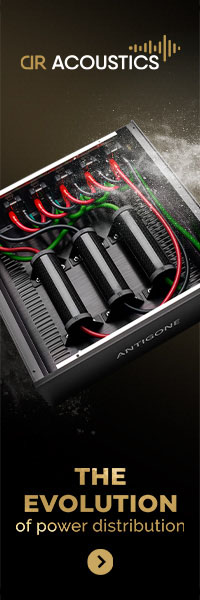Talon Audio’s Raven C Loudspeaker
| Talon Audio’s Raven C Loudspeaker |
|
|
|
Joe Lamano |
|
7 April 2003 |
 Specifications
Specifications
Height: 40 ¾”
Depth: 20 ½” at base; 12” at crown
Width: 17 ½” at base; 9 ¼” at crown
Weight: 130 lbs.
Bandwidth: 19 Hz – 25 kHz
Power Handling: 1-1000 Watts
Nominal impedance: 8 Ohms
Price: $6,500 in textured black, optional finishes $7,500
Address:
Talon Audio Technologies, Inc.
5175 South Green Pine Drive
Murray, UT 84123
Telephone: 801-619-9000
Fax: 801-619-9001
Web site: www.talonaudio.com
I learned of Talon Audio slightly over one year ago, during my pursuit of speakers that suited my listening preferences. It was then that I first had the opportunity to hear the Khorus X. It was a wonderful-sounding speaker with bass that was tight and fast, imaging that was transparent, and dynamics that were stunning yet with a relaxed and inviting quality. These speakers possessed all the qualities I was looking for, but the nearly $16,000 price tag would surely be limiting for others. Realizing this, Talon began creating a loudspeaker with similar build and performance to the Khorus, but in a more affordable package. The result was the Raven, priced at only $6,500.
The Raven (now in its C version) has the same non-traditional “obelisk” shape of the Khorus, but that’s where the similarities end. The impressive exterior disguises the simplicity of the loudspeaker’s rather basic internal design and complex engineering that brings it all together. Unlike some other large floor-standing loudspeakers, the Ravens are unencumbered by multi-driver arrays with complex crossover designs trying to perfectly time-align the drivers to artificially create a warm or three-dimensional sound. Instead, a simple 2-way, 2-driver design is used to provide an expansive and liquid soundstage that has excellent imaging and strong dynamics. But don’t misunderstand my statement about simplicity; Talon Audio spends a great deal of time continuously improving the performance of their design with a tremendous focus on cabinetry and crossovers. Some have actually accused Talon of being more of a research and development company because of the amount of time and energy they put into the pursuit of the optimal speaker design. After speaking with the people at Talon, I found that they are not only engineers, but also audiophiles who really love what they do.
The build quality and esthetics of the Ravens are as impressive as their sound. Each Talon loudspeaker is designed, hand crafted, and tested in their Murray, UT facility. My pair of Ravens arrived in individual large, heavy-duty, double cardboard boxes, mounted on shipping skids and packed with enough foam padding to protect them from almost any shipping mishap. They were finished in an opulent High Gloss Burl (one of many optional finishes) and weighed in at approximately 130 lbs. each. The neither sealed nor ported (a clever slot design is used) cabinet is slightly shorter and weighs 70 lbs. less than the Khorus X, but has the same internal volume, and utilizes Talon’s patented “group phase technology.” But despite being somewhat smaller, this is still a pretty big speaker, and takes up a good amount of floor space. The front grille is shaped similar to the Talon logo and uses a unique method for attaching to the speaker. As you hold the grille close to the speaker, internal magnets pull the grille in and snap it into place—I found this to be a very neat method. The rear panel provides only a single speaker connection, so those looking to bi-wire are out of luck, although it is probably not necessary with this speaker design. The binding posts provide quick access and a very snug fit, but they limit the cable termination to spade connectors only.
Internally, the balanced crossover design uses Talon’s “Common Mode Rejection Circuit” (now offered as an upgrade on other Talon models), which eschews the use of any filters. This design provides steep slopes of about 30dB with less phase shift than series crossover designs. The multi-gauge internal wiring has been designed by Talon engineers and is manufactured by Kimber Kable. The focus on crossover design has yielded a very low noise floor that has resulted in an extremely quiet background for the music. These speakers have the ability to reproduce amazing detail, and bring instruments into and out of the soundstage with clarity and powerful dynamics.
The Ravens are very transparent and therefore, easily influenced by other components in the signal chain, and placement within the listening area—which is not a bad thing for those who enjoy tweaking their system. Several setup configurations can be used, depending on personal preference. I found that spreading these speakers far apart (approximately 8 – 10 feet) and having them slightly toed outward (yes outward) provides a very liquid midrange and treble, and a wide soundstage. After speaking with the folks at Talon, I changed my configuration and now use three spikes per speaker versus four; this produced additional low-end detail with slightly tighter bass. Those that prefer more bass with slightly less detail should use four spikes per speaker. In addition, although each room is different, I found that placing the speakers approximately 3 feet from any wall provided optimal bass response.
The Ravens are outfitted with a single 10” proprietary Talon woofer and Accuton tweeter. The low frequency response is amazing, and very comparable to that of the Khorus X. These speakers provide some of the finest low frequency response that I have heard. The bass response is very deep, tight, articulate, and fast. When I invited friends over to listen to the Ravens, I was asked to shut off the subwoofer. Much to their surprise I was not using a sub. That’s how deep these speakers go. The detail and speed of the bass is similar to that of speakers using smaller drivers for better control; however, this 10” Talon woofer is easily controlled. As I significantly increased the power from my Pass Labs X150 amplifier, the Raven stayed very stable and without any of the audible mechanical noise typically resulting from lesser speaker designs.
The Ravens are unaffected by different genres of music. The sound remains consistent and the speaker does not favor one over another. I listened to the jazz recordings I have, ranging from classic Miles Davis recordings to the new Norah Jones disc. In addition, I threw in the Rolling Stones, Stevie Ray Vaughn, Pink Floyd, Rickie Lee Jones, and Sting to give me a mix of rock, blues, and pop. Norah Jones’ Come away with me [Blue Note 7243 5 32088] is filled with tracks that demonstrate the Raven’s capabilities. The bass throughout the disc is represented not only with detail, but a presentation that is so natural that you feel as if you are standing next to the musicians. The slow and soft bass work on this disc strikes deeply, yet softly, and decays with full detail. Many speakers allow you to hear the music, but not many allow you to feel it as well. The high frequency reproduction has detail, clarity and a wide soundstage. The Accuton ceramic tweeter provides excellent high and mid-frequency resolution that is relaxed and smooth without edge or hardness. The gentle vocals and guitar work at the beginning of “Nightingale” demonstrate quietness in the backdrop and naturalness in the midrange. Throughout the disc, Norah Jones’ vocals and piano notes appear to float out of the speakers and into the room with tonal balance and great dynamic range, while the subtle brush strokes of the drummer are clearly distinguishable in the background.
Personal preference is a key component to speaker selection. Some people are biased towards the warm smooth sound of speakers with some coloration, while others prefer a more musically accurate reproduction. The longer I listened, the greater my appreciation for the capabilities and sound of this speaker became. In my opinion, to truly appreciate Talon’s achievements, one must be familiar with other loudspeakers to really make a good comparison. Only then, will one notice how musically accurate these speakers really are. The Raven, like the other Talon models, have well-articulated midrange and treble with a relaxed and inviting neutral presence. I admit that I was initially skeptical of a 2-way design on a speaker this size, but I was blown away by the realism and natural-sounding presence of the midrange. All frequencies are presented in a uniform manner without bringing the midrange forward, or exaggerating the bass. This is a different presentation format from other speakers that may be designed to bring the midrange forward, or extend the high-frequency range (almost like turning up a treble control), or present the bass in an overpowering manner that typically results in muddled sound. Stereo imaging is excellent and minute details are reproduced with great clarity and dimension. Front-to-back and side-to-side, the location of instruments and musicians within the soundstage is easily recognizable. Each instrument’s sound is reproduced in it’s own space, with controlled attack and decay. The blast of a horn, crash of a cymbal, or strum of steel acoustic guitar strings, are all presented in their own space and softly fade away into an ultra-quiet backdrop. The speakers truly have the ability to accurately reproduce the sound of an entire band or orchestra with realism and an inviting sound that can be enjoyed without listening fatigue. The Talon Audio Raven C is highly recommended.
With the Raven, Mike Farnsworth and the team at Talon Audio have created one of the “best in class” loudspeakers. The strong focus on cabinetry and crossovers, and the use of high quality drivers has resulted in a speaker capable of delivering highly detailed reproduction with great breadth and depth. At $6,500 the Raven is not an inexpensive speaker; however, it will go head-to-head in all aspects with speakers costing significantly more. The low-frequency response is awesome, and rivaled only by other Talon speakers.
![]()
Don’t forget to bookmark us! (CTRL-SHFT-D)
Stereo Times Masthead
Publisher/Founder
Clement Perry
Editor
Dave Thomas
Senior Editors
Frank Alles, Mike Girardi, Russell Lichter, Terry London, Moreno Mitchell, Paul Szabady, Bill Wells, Mike Wright, and Stephen Yan,
Current Contributors
David Abramson, Tim Barrall, Dave Allison, Ron Cook, Lewis Dardick, John Hoffman, Dan Secula, Don Shaulis, Greg Simmons, Eric Teh, Greg Voth, Richard Willie, Ed Van Winkle, Rob Dockery, Richard Doran, and Daveed Turek
Site Management Clement Perry
Ad Designer: Martin Perry





Be the first to comment on: Talon Audio’s Raven C Loudspeaker